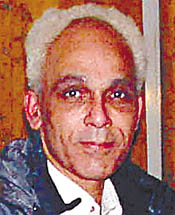|
|
 |
| |

Barry Sullivan |
Round 10 in secret files fight
Lawyer maintains compensation claim
is behind bid to see Town Hall emails
A LONG-serving volunteer was described as a “pseudo-advisor”
in court on Friday as a council lawyer claimed his ongoing battle
to see secret files held on him at the Town Hall was preparation
for a compensation claim.
Friends and colleagues of Barry Sullivan, who runs Camden Town
Neighbourhood Advice Centre (CTNAC), condemned comments made
by lawyer Hamilton Daley as unfair.
Sparks flew during the 10th court hearing in the long-running
saga over whether Mr Sullivan can view council files and emails
stored at the Town Hall.
The council claims it has already passed on all relevant documents
and is only withholding files restricted by legal rules.
But Mr Sullivan and his supporters say that all emails should
be disclosed.
The case has run for two years – with hearings at London
County Court in Regent’s Park, the Information Commission
and the High Court. It follows the revelation in the New Journal
two years ago that council workers were circulating suggestions
that Mr Sullivan was dealing in drugs and involved in fraud.
None of the allegations has ever been substantiated. The emails
were passed around against the backdrop of CTNAC’s controversial
eviction from council-owned headquarters in Greenland Road in
December 2003.
Riot-squad police evicted charity workers from the building,
which, more than two years later, is still being refurbished.
CTNAC now operates from St Martin’s Close.
Mr Sullivan told Friday’s hearing at the London Court that
he wants to view all the files and have them amended if they
contain inaccuracies and unfounded allegations. He said: “I
have had this hanging over my head for two years. It has affected
my health to a certain extent. It is not fair to keep on going
like this.” Mr Daley described Mr Sullivan’s role
at the helm of CTNAC as that of a “pseudo-advisor”,
adding that the search for documents was based on a planned
compensation claim.
He said: “This is the real bone of contention, a search
for documents to base a compensation claim on. What else would
justify this matter going on so long?”
Judge Charles Harris told Mr Sullivan that the case had been
delayed because it was based on an area of law that was rarely
explored. He told Mr Sullivan and Cathy Pound, a friend who
represented him in court, that he was sorry for the delays
Judge Harris said: “You are paying the price for being
pioneers and I am sorry for that.”
He told the court that the file of papers would be reviewed
by a judge and a decision would be made on whether the council
should disclose them. |
|
 |
|

